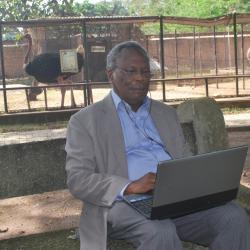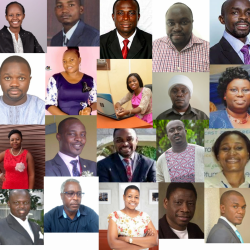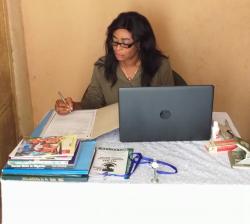The past couple of years have highlighted the important role of digital platforms and digital learning in improving equity of opportunities for researchers, students and others to develop skills, network with others and participate in the global knowledge ecosystem. Building on INASP's long experience in this area, in 2021, more than 7,500 early-career researchers, as well as journal editors and university lecturers and students, gained valuable skills for their jobs through digital platforms and digital learning offered by INASP and partners. Last year we also worked with others to increase understanding about how digital technologies are used in research and higher education in low- and middle-income countries.
AuthorAID picks up award for online courses
Researchers in low and middle-income countries (LMICs) face many challenges in communicating their work, including lack of familiarity with global scholarly publishing; lack of experienced colleagues to advise on publishing; inexperience of scientific writing; and language barriers, in addition to inherent biases in global scholarship. AuthorAID MOOCs are designed to address these challenges in ways that are appropriate to the context that participants work in. Since we started running MOOCs in 2015, around 30,000 early-career researchers in LMICs have benefitted from support in research writing via the courses. Last year the impact of this digital learning platform was honoured with a new award, the Hidden REF, which was set up in recognition that the ways in which the research impact is judged overlooks many of the people who are vital to the success of research.
"I personally enjoyed how the course was well organised, timely based, peer interactions with my course mates but also with my facilitators, with enough chance to pose questions and enquiries and feedback from the facilitators. From this course I am now in a good position to use different ways to access academic publications, knowing how to access paywalls, how to process ethical issues for research and publications, proper use of research methods in relation to research projects."
Researcher, Tanzania
Stronger national journal publishing increases research relevance
Building on over a decade of work in partnering with national and regional organisations to establish and handover to local management the Journals Online platforms, within the publishing strand of our Global Platforms for Equitable Knowledge Ecosystems (GPEKE) programme, INASP has been supporting journal editors with their publishing processes. In 2021, we held two online courses for journal editors, providing training to help improve their publishing processes, enabling them to foster greater research impact in the countries.
Innovation in digital learning is helping make higher education more resilient in Ghana, Kenya, and Nigeria
Digital learning can help open up access, serve learners better and make higher education more resilient. And, in Ghana, Kenya and Nigeria, many faculty members are quietly innovating, often below the radar of their institutions and their colleagues, and frequently unsupported. These are two of the key findings from new work, undertaken by an INASP team and commissioned by the British Council, as part of the council’s Digital University in Africa programme.
"The transformative learning [TESCEA online course] has been a very good thing to us ... [it] helps us to engage write our thoughts. Sometimes not all of us are able to talk out ... but with this transformative learning, due to the journals and forums found on [the course] we are able to write our thoughts about specific topics ... it has really enabled us think beyond and I'm so proud of it."
Nassozi Mariam, Student, Uganda Martyrs University, speaking about online training within the TESCEA project - see the Transforming higher education section of this review for more about this work.
Could digital tools, AI, and social learning spaces help to reduce inequity in knowledge systems?
Understanding the role of digital technologies to advance research and knowledge in the South is important to ensure that INASP's network can support and encourage innovation where it is most needed. During 2021, we called for projects to help contribute to this understanding. The projects selected cover the role of digital tools and machine learning in mapping knowledge communities in Guatemala; how digital tools be harnessed to collect better and more relevant data on entrepreneurship and employment and the wider business climate in Cameroon; and how digital tools and artificial intelligence can break some of the barriers in scientific collaboration, communication, and the use of research evidence across the African region. In 2022 we look forward to sharing some findings from these projects.
INASP’s self-study tutorials reach learners around the world
Online teaching and learning have come to the forefront of discussions about education over the past year and a half. And for INASP this has provided opportunities both to share our expertise and to innovate to address new needs that we see within our networks. INASP's collection of online self-study tutorials enables users to develop skills at their own pace.
Back to annual review main page






